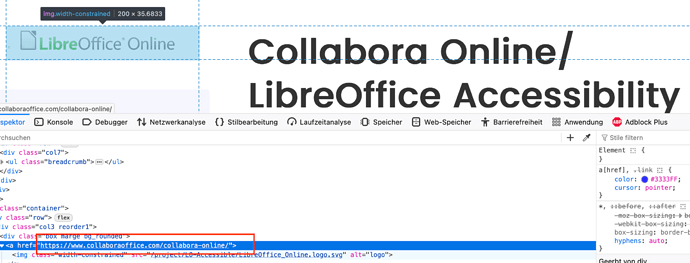Hi Michael,
I haven’t attacked anyone, I’ve just presented facts that are there for all to see.
There is a LibreOffice OnLine logo, the mention of LibreOffice and a description that also states:
“The goal of this project is to implement improved accessibility for Collabora Online. The core of the proposal is to add accessibility to the edit view of documents, which are currently just pixels for a screen reader.”
Are the facts just a simple misunderstanding?
Did someone at NLNet, out of their own initiative, decided to get the LibreOffice OnLine logo and put it there despite the fact that it isn’t mentioned anywhere and the link points to your own project?
If it was a mistake then I should contact them, explain to them that no contributions from that funding went to the LibreOffice Online project and ask them to contact you to get the right logo.
Is then the project actually related to LibreOffice or only to Collabora Online?
The description seems to indicate that it’s only relevant to Collabora Online as the bit saying “are currently just pixels for a screen reader” doesn’t seem applicable to LibreOffice desktop.
Also the title states:
Private and accessible collaborative editing with Collabora Online/LibreOffice
As the feature has been funded also for LibreOffice, why I do not see any features related to “Private and accessible collaborative editing” in LibreOffice?
Or was also that text an initiative of someone at NLNet?
As we all value what NLNet did for many Open Source projects and if funds are available we should apply as well then it’s important for TDF to understand how the process works and who decides which logos and text to use.
It could turn out to be a mistake from their side, it happens, and they should fix that page but it could turn out that you did it all and that would be quite problematic.
We’ll ask and we’ll let everyone know.
Was LibreOffice OnLine, with written in all its files “This file is part of the LibreOffice project” and promoted using TDF’s trademarks and marketing team as well using TDF’s resources, a community project that should have been made available to all?
After having asked for clear answers for a while and not having received any satisfactory answer then it was my duty to clarify the situation.
I presented a motion to finalise what the name of the product and the actions from TDF were implying, that finally helped you in taking in consideration the questions of a deputy member of the board asking nothing more than clarity.
You agreed with the entire board to allow TDF to publish usable version of LibreOffice OnLine to the community in exchange of a proper marketing plan supporting “the ecosystem”.
The whole board and the marketing team got to work on it and then, without warning, you breached the agreement and forked the project. That’s the short and diplomatic story which at least clarified what LibreOffice OnLine was.
If you want to carry on attacking me for having performed my duties then we should share more board minutes and documents to clarify the situation once and for all.
Nope.
As any other Open Source projects TDF can and should seek fundings where available to increase its capacity to further its mission and goals including contributing directly to LibreOffice which in turn will allow TDF to have more skills to deal with mentoring and educational projects around the world.
I thought you would be very supportive of this initiative as it will help the project and increase TDF’s capacity to mentor and support even more developers around the world.
Ciao
Paolo



